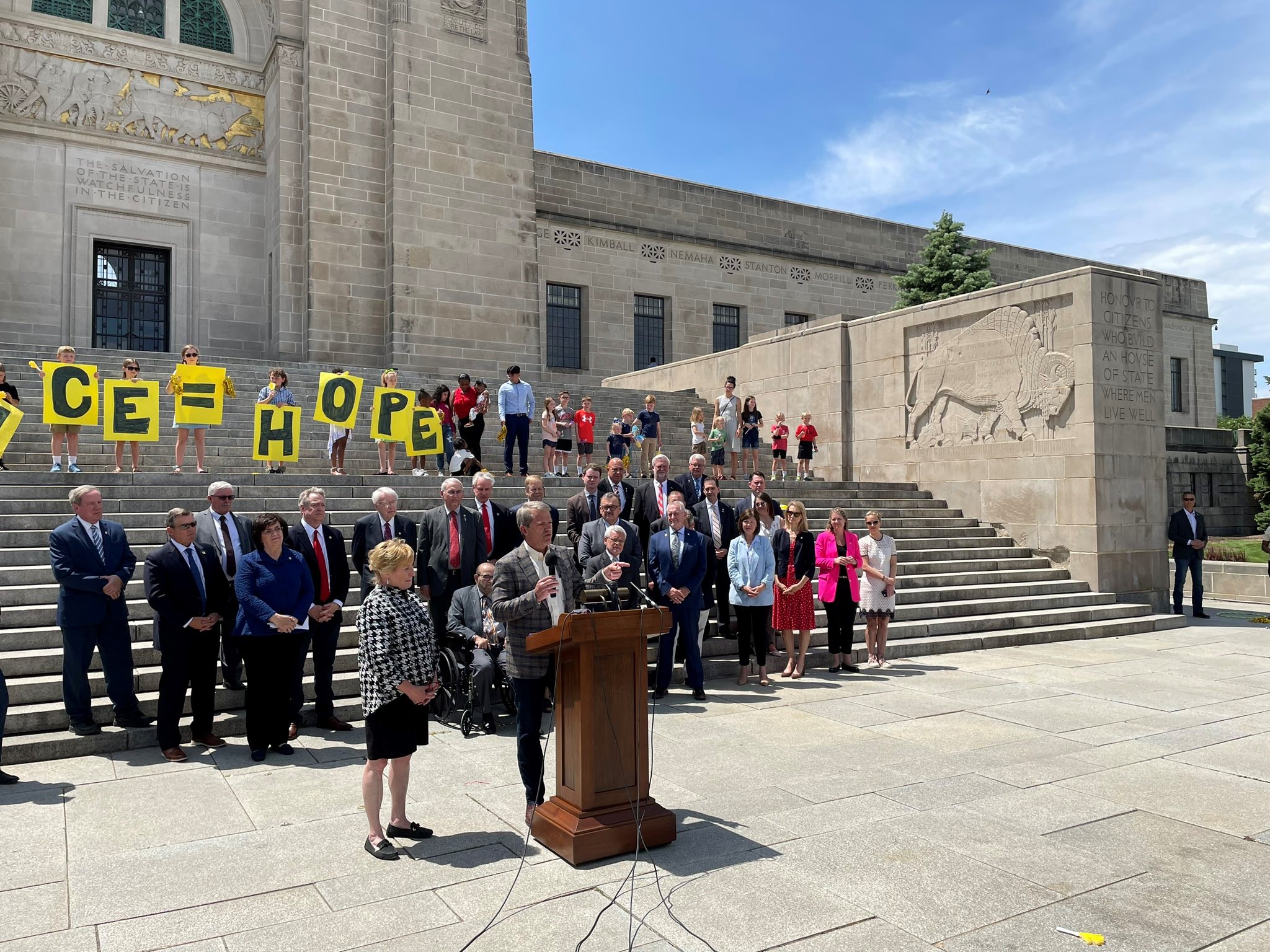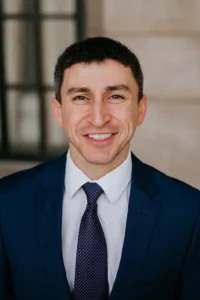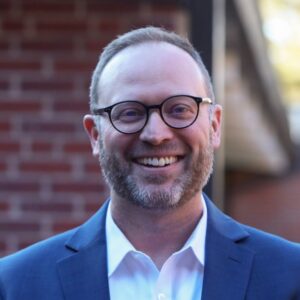
State Sen. Lou Ann Linehan of Elkhorn appears with Gov. Jim Pillen and other senators, students and school choice advocates outside the State Capitol in Lincoln to celebrate the signing of the Opportunity Scholarships Act last year./GOV. PILLEN’S OFFICE
News
Referendum on scholarship program likely headed to court
March 6, 2024
A Nebraska court is expected to be the next stop for a voter referendum seeking to repeal the law that created tax credits for donations to scholarship funds that help students from low-income families attend private and parochial schools.
Nebraska Secretary of State Bob Evnen announced on Feb. 29 that the referendum would stay on the November ballot, that it was outside of his purview to determine the referendum’s constitutionality.
That paves the way for a court to decide the matter, said State Sen. Lou Ann Linehan of Elkhorn, who last year introduced and helped push into law the Opportunity Scholarship Act, which helps families in need send their children to the school of their choice.
Linehan maintains that only the Legislature can decide tax policy.
“I believe in the referendum process, I really do,” she said in a phone interview. “But I also believe in the Constitution. And the Constitution says that only the Legislature should deal with tax policy. It’s very clear.”

State Sen. Lou Ann Linehan/NEBRASKA LEGISLATURE
Linehan said she likely will ask the Legislature, through its Executive Committee, to appeal Evnen’s decision, which would send the matter directly to the Nebraska Supreme Court.
For the scholarship tax credits – and for other potential issues that could come up in the Legislature – it would be in the body’s best interest to protect its duty and authority over state revenue, Linehan and others have argued.
The state senator and other school choice proponents have sought other ways to preserve the Opportunity Scholarship Act, which last year was approved by the Legislature and signed into law by Gov. Jim Pillen.
This year Linehan introduced a new version of the Opportunity Scholarship Bill, LB 1402, which would provide direct state funding for the scholarships and replace last year’s law. The changes would effectively nullify the referendum, said Linehan, who made LB 1402 her priority bill.
Last month the Appropriations Committee advanced the bill on a 6-3 vote, sending it to the full Legislature for debate.
“I’m not worried about the constitutionality of it,” Linehan said of LB 1402. The funding would be directed toward students and not parochial schools. The state already has a scholarship program for low-income college students that courts earlier had ruled could be used at both private and public colleges, she said.
The state also provides money for early childhood education at private institutions. For “some reason, people think that if we go to the courts for K-through-12, they’re going to decide differently,” Linehan said. “They’re not. The money goes to the kids,” and the students and their families pick the school.
“This is ensuring that every family has educational opportunity … and equity in being able to make educational choices,” said Tom Venzor, executive director of the Nebraska Catholic Conference.

Tom Venzor, executive director of the Nebraska Catholic Conference/NCC
“Every family deserves the opportunity to get to a school that’s best for their kid,” he said. “And that’s what LB 1402 is about. It’s about making sure every family has the financial means to get to a school that’s best for them.”
Opportunity Scholarships of Nebraska – one of the new law’s scholarship-granting organizations – has had about 5,000 students express interest in scholarships in its first few months of operation, said Jeremy Ekeler, executive director.
But the need is more than numbers, Ekeler said. It’s about each individual child.
“So protecting this has become less political and more personal to us. I hope every Nebraskan sees that this is about people’s lives.”

Jeremy Ekeler, executive director of Opportunity Scholarships of Nebraska/OSN
“We can have great public schools and we can give people choice,” he said. “Both of these things can be true.”
School choice allows “what’s best for children,” Linehan said.
“People claim I beat up on public schools,” Linehan said. “I really don’t. All my grandkids in Nebraska attend public schools.”
School choice not only helps families, but the state as a whole, she said.
The senator said she’s confident the state eventually will embrace school choice policies, but she’s hoping that happens sooner rather than later.
Nebraska needs school choice to be competitive with surrounding states, especially Iowa, which provides $7,000 for students to go to the school of their choice, she said. Already Linehan has learned of military members stationed at Offutt Air Force Base who are choosing to have their families live in Iowa because of that advantage.
Ekeler said LB 1402 is “an awesome bill because it does what we think the state is compelled to do, which is help vulnerable children find the right education and uses a mechanism that’s different than the tax credit.”
Both last year’s Opportunity Scholarship Act and this year’s replacement proposal are aimed at helping children from low-income families, military families or are in foster care or who have experienced bullying.
Direct funding from the state would help ensure that children could get scholarships quickly, Ekeler said.

Students at Holy Name School in Omaha gather for a picture./COURTESY PHOTO
Linehan said she expects a struggle in the Legislature over LB 1402, similar to the fight over the Opportunity Scholarship Act last year. But she remains optimistic.
“I think it’s got a good chance,” she said. “One of the most important things is we got 33 votes last year. The same 33 senators are there (now). … And really important is we’ve got a hundred percent – or a hundred plus percent – support from the governor.”
She urged people to contact their state senators, even to express thanks to those who have been supportive of school choice. “A lot of them will be pressured to change their minds,” Linehan said.
Emails are fine, she said, but make sure the message is personal. “If I get a personal email, my staff will flag it for me. What I mean by personal is they tell me something about themselves and why they’re for this. … I don’t pay too much attention to” mass-generated emails with people “just hitting a send button.”
Linehan urged people to act soon because days of the short legislative session are dwindling.
Ekeler said that it’s important to get the truth out about the scholarship program, “that it helps families and does not hurt other Nebraskans.”
Those who have benefited from a private or parochial education need to share their stories, he said, “the impact the schools have had on you and that school choice has had on you.”
Venzor encouraged people to become part of the Nebraska Catholic Conference Advocacy Network. “Our network is how we can most quickly get in touch with our advocates so they can reach out to their state senators and talk to them.”
Linehan also stressed prayer.
“Keep the prayers coming,” she said. “They’re important.”
Linehan said she expects the school choice battle to continue for years.
“This is not a one-and-done thing.” It will require constant vigilance, “just like in our lives – our religious lives, our personal lives. Nothing’s ever done. You’ve got to make sure that you’re paying attention and keep pushing for the right things.”
READ MORE FROM THE CATHOLIC VOICE: